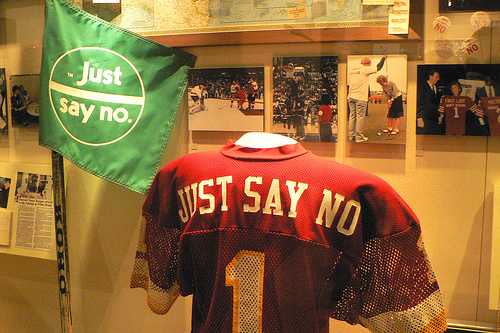When “Just Say No” is not enough.

I have a book on my nightstand written by Betsy Brown Braun, “Just Tell Me What to Say”. It is a guide book of answers to our kids’ questions.
This morning, I read this great post by a mom, who wrote about how teenagers may need a guide with the same title.
Our teens are in dire need of our assistance in forming the words to respond to their peers, who have already or are inevitably going to introduce them to drugs and alcohol along with other “bad” behaviors.
Let’s help them develop a script of answers and sayings when they want to “Just say NO” with an explanation that saves their friendships and perhaps even dissuades their friends from making “bad” choices.
Here are some we decided upon together:
When you notice a lonely kid: Hey! Here’s a seat for you. Come join us.
When someone offers you a beer: No thanks. My family’s genes and alcohol don’t mix well. Can’t risk it. (This was how he felt comfortable explaining that alcoholism runs rampant in our family and makes drinking even riskier for Chase than for the average bear.)
When someone offers you weed: My mom used to smoke pot when she was younger and now she can smell it from a mile away. She checks my clothes every night. Can’t do it, man. (That’s the one that won, but I liked: HEY! How about we put down these joints and go volunteer at the dog shelter! He liked the first one. Whatever, his show.)
When someone starts texting while driving: Hey, I just saw a movie about a kid who got killed because he was texting and driving. I don’t want you to get killed because I plan to ask you for many, many rides in the future. Pull over if you need to text — I’m not in a hurry.
You find yourself in a sexual situation you’d prefer not to be in: Hey, I like you too much for this to go down this way.
A kid is being teased by another kid in the hallway: Hey. I don’t want anybody to get in trouble here. Why don’t you follow me out of here? I’ll walk you to class.
Someone is about to drink and drive: Don’t risk it, man. My dad’ll get us home — no questions asked. He’d rather pick us up here than in jail.
I don’t know if my ‘tween will use these life preservers we made together. But when that moment comes he will know that they’re available if he wants to save himself. And when he leaves the house in the evening and I say to him, just like when he was two, Use your words tonight — I know he’ll have words to use.
via The One Conversation That Could Save Your Teen’s Life (And Your Own) | Glennon Melton.
Thank you to Glennon Melton for this insightful article about how to “Just Say No” in a way that will not cost a teenager too much angst.
We all know, saying “NO” is only part of the conversation.
Let’s move forward as parents and grandparents and give out kids the words and explanations to go along with the “Just Say No” advice. It could make a huge difference in how they travel through the challenging world of adolescence.
